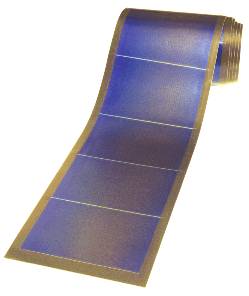Unisolar solar panels are a little different than the other solar panel kids.
In fact, they aren’t so much solar panels as thin-film solar laminates.
Unisolar is a world leader in thin-film technology and has developed a technology to reduce the materials cost in a solar cell.
Unisolar efficiency has also achieved world records for thin-film panels.
They have accomplished this through a “multi-junction” approach that lays different levels of amorphous cells on top of one another.
What are the benefits of this thin-film technology?
- Flexible
- Light-weight
- Easy to install
- Durable
- “Real world” efficient
Are you wondering about the difference between “thin-film” technology and a standard solar panel?
Well, here are the basics: Thin-film is cheaper but it is less efficient so you’ll need to use more space to achieve the same output as traditional solar panels.

So, you say, if thin-film is less efficient why does Uni-solar tout their “real-world” efficiency? This is because thin-film technology performs better than a solar panel in cloudy or hot conditions. Depending on your climate, this could be a big advantage.
Thin-film technology is an exciting growth area in the solar world and Uni-Solar solar panels will be at the forefront of the movement.
Here are the specs on Uni-Solar products:
Note: If you want to know more about what these stats mean check out solar panel info.
Now, onto the stats…
- Rated Power at STC (Standard Test Conditions)
This will be the “advertised” wattage of the panel you’re looking at (e.g. 180 watt or 205 watt). - Rated Power Tolerance (%)
+/-5% - Rated Power Per Sq. Ft. (Watts)
PVL-68 – 5.6
PVL-124 – 5.8
PVL-136 – 5.8 - Module Efficiency (%)
PVL-68 – 6.1
PVL-124 – 6.3
PVL-136 – 6.3 - Materials Warranty (Years)
None - Power Warranty (Years)
20 - Cell Type
Amorphous Silicon (a-Si) - Maximum Power Temperature Coefficient (% per °C)
-0.21
